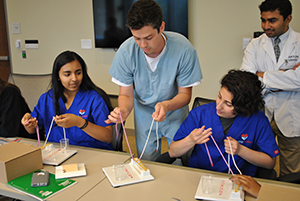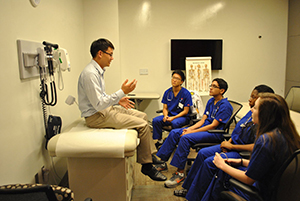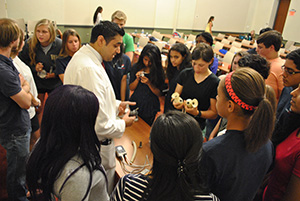
Camp organizer Ameya Chumble watches cardiology fellow Ryan Melchior, M.D., leads students through the surgical knots workshop.
When Ameya Chumble was in high school in Martinsville, Va., summertime educational opportunities were slim to none. Especially in specialized areas such as medicine.
Now he’s a rising second-year student at the VCU School of Medicine. During his first year on VCU’s MCV Campus, he learned about Camp Cardiac, a national day-camp for high school students interested in learning about medical careers. He jumped at the chance to establish a Richmond site of the program.
With the help of medical school faculty members – all volunteers – Chumble and a team of 14 medical students created an impressive schedule of presentations and activities. From obtaining CPR certification and learning suturing techniques, to hearing case studies and observing a live surgery, the high school students spent an action-packed week on campus.
Most of the 25 campers came from high schools in and around the Richmond metro area. One exception was a Seattle, Wash., student who attended the camp while her family visited the area during an extended vacation.
To apply, campers submitted a 300-word essay outlining their interest in attending, what they hoped to learn from the experience and why they were interested in the health care field. Scholarships were available to help cover the cost and meals were provided at no charge by the national Camp Cardiac organization.
“Since this was our inaugural year, we didn’t know what to expect of the campers,” Chumble says. “We ended up with a highly motivated and impressive group of individuals. Our students were flying through materials and tasks people usually don’t see until their first year of medical school. It was amazing.”

Camp Cardiac Staff acted as patients so the campers could get a taste of what it’s like to take a patient’s medical history.
Established in Chicago in 2010 by cardiac surgeon Richard Lee, M.D., and three medical students, Camp Cardiac introduces high school students ages 15 and older to the real world of medicine. It focuses on both classroom teaching and hands-on experiences. It also serves as a springboard for students to develop self-awareness of a heart healthy lifestyle.
The importance of healthy living became all too clear during a presentation by Jordana Kron, M.D., associate professor of cardiology and program director of the Clinical Cardiac Electrophysiology Fellowship. Kron and her patient, Mel Shaffer, provided a living example to illustrate the students’ weeklong coursework.
“I remember hearing patient stories when I was in school,” Kron says. “To hear something from a patient’s point of view means so much more.”
Shaffer told his first-hand account of how chest pains at the gym turned into sudden cardiac death: a disruption of his heart’s electrical system resulted in a potentially deadly malfunction. The unexpected condition can sometimes be successfully treated with CPR or defibrillation as it was in Shaffer’s case. He was shocked 11 times after being brought to the emergency room.
Kron presented Shaffer’s electrocardiogram history to the students and asked them to interpret the readout. After hearing his story, they peppered him with questions about his pacemaker and stents as well as his lifestyle changes.
“The students were very attentive and asked a lot of great questions,” Shaffer says. “They were very responsive, which showed they were not only listening attentively, but were comprehending complicated concepts. They had an obvious interest in a career in medicine based on their response and participation.”

Campers get an up-close look at the technology that powers artificial hearts with cardiology fellow Amit Varma, M’06, H’12.
Kron will definitely volunteer to be a part of next year’s Camp Cardiac.
“I hope I’m asked to do it again,” she says. “The week’s itinerary was outstanding and it was a great success.”
Chumble and his team started planning the camp nearly nine months in advance.
“Finding professors took time, but they were very gracious,” he says. “We couldn’t have done it without the Departments of Anatomy and Neurobiology, Cardiology and Cardiothoracic Surgery. Their interest and support was overwhelming.”
The 2015 Camp Cardiac was so successful, the MCV Campus now is eligible to host its sister camp, Camp Neuro.
Chumble hopes to serve in an advisory capacity for next year’s camps, but most of the program’s leadership and coordination will be passed onto interested students in the Class of 2019 so that Chumble and his teammates can concentrate on their studies. In early 2016, they’ll take Step 1 of the USMLE national boards and then will move into clinical rotations and the chance to work with more patients like Shaffer.
“This year’s event was a lot of fun. I couldn’t have thought of a better way to spend a week out of my summer.”